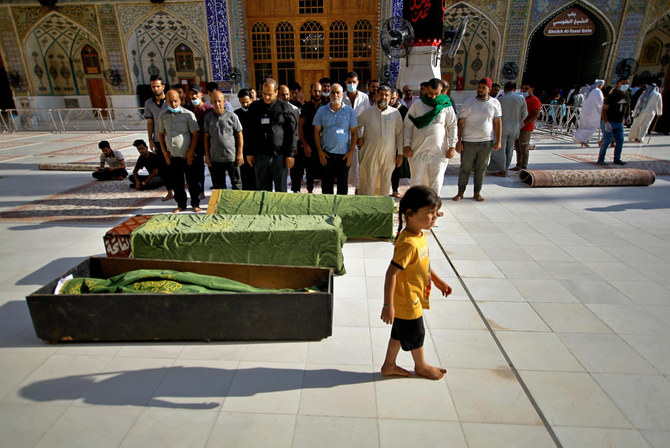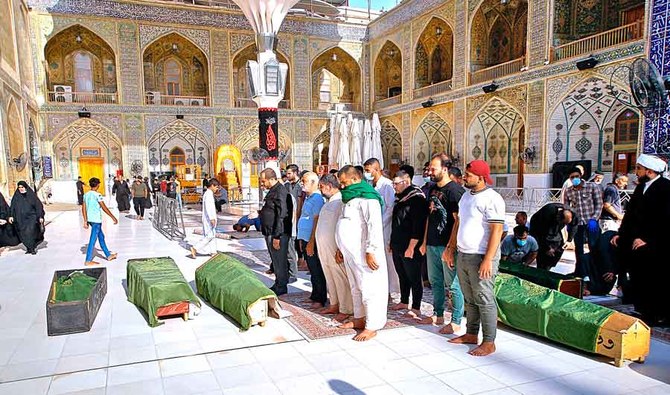BAGHDAD: Iraq was in mourning on Tuesday for at least 36 people killed when a bomb ripped through a crowded Baghdad market in what Daesh terrorists claimed as a suicide attack.
The bloody carnage Monday evening, one of the deadliest attacks in years in the war-scarred country, killed mostly women and children on the eve of Eid Al-Adha.
It sparked revulsion and renewed fears about the reach of Daesh, which lost its last territory in Iraq after a grueling campaign that ended in late 2017, but retains sleeper cells in remote desert and mountain areas.
The extremists claimed on the Telegram messenger service that a Daesh suicide bomber had detonated an explosives belt in the bustling Woheilat market of Baghdad’s Shiite district of Sadr City.
In the panic and chaos of the attack, screams of terror and anguish filled the air. When the smoke cleared, human remains lay strewn amid scattered sandals, market produce and the charred debris of stalls.
Iraqi President Barham Salih condemned the “heinous crime of unprecedented cruelty on the eve of Eid,” writing on Twitter that the perpetrators “do not allow people to rejoice, even for a moment.”
The UN Mission in Iraq said the attack showed that “the scourge of terrorism knows no bounds,” while the German Embassy expressed its “sadness after this senseless and brutal attack.”
No official death toll has yet been released by Iraqi authorities, but medical sources said that at least 36 people were killed and about
60 wounded.
Prime Minister Mustafa Al-Kadhemi said the “cowardly attack illustrates the failure of terrorists to regain a foothold after being defeated by our heroic security forces” and vowed that “terrorism will not go unpunished.”
The attack came days before Al-Kadhemi was to meet US President Joe Biden in Washington, and ahead of a scheduled parliamentary election in October.
“This is a clear message that Daesh is still present and is able to strike targets in Baghdad,” said Osama Al-Saidi, head of the Iraqi Political Science Association.
“Whenever elections approach, terror attacks happen with the aim of sending a political message that those governing are weak.”
Deadly attacks were common in Baghdad during the sectarian bloodletting that followed the US-led invasion of 2003, and later on as Daesh swept across much of Iraq.
Iraq declared Daesh defeated in late 2017 after a fierce three-year campaign and attacks became relatively rare in the capital — until January this year when a twin suicide bombing claimed by Daesh killed 32 people in a Baghdad market.
The US-led coalition that supported Iraq’s campaign against Daesh has significantly drawn down its troop levels over the past year, citing the increased capabilities of Iraqi forces.
The US, which provides the bulk of the force, has 2,500 troops left in Iraq — down from 5,200 a year ago. They carry out airstrikes, drone surveillance and training of Iraqi forces.
US forces have come under repeated attack from paramilitary groups, integrated into the Iraq security apparatus, that support Iran.
The latest attack sparked condolences from abroad, and recriminations among Iraqi political leaders.
Russian President Vladimir Putin said “the murder of dozens of civilians ... is shocking in its cruelty and cynicism” and urged that the perpetrators “receive the punishment they deserve.”
Iran’s foreign ministry also condemned the “barbaric act.”
At home, parliament speaker Mohammed Halbousi called for “leadership changes among senior security officials who have proven their dereliction of duty.”
Lawmaker Adnan Al-Zurfi accused commanders of the Falcon Cell counter-terrorism unit of having turned from “intelligence gathering to politics.”
Iraqi analyst Jassem Al-Moussaoui said the attack highlights “the weakness of the security forces which have not been formed on a professional basis but according to their political loyalties.”
Many ordinary Iraqis meanwhile shared their grief, exhaustion and sense of helplessness in a country that has endured decades of war and insurgency, as well as an ongoing deep economic and political crisis.
In a widely shared social media post, comedian Ahmed Al-Basheer recalled that only days ago at least 60 people died when a fire tore through a Covid hospital unit in the southern city of Nasiriyah.
“Every day there’s a new calamity,” he wrote. “We’re tired of everything.”
Families lay to rest loved ones after deadly Baghdad blast
https://arab.news/rpp6k
Families lay to rest loved ones after deadly Baghdad blast

- Daesh claimed it had sent the suicide bomber into the popular market
- Whenever elections approach, terror attacks happen with the aim of sending a political message that those governing are weak
For Syria’s Kurds, dream of autonomy fades under Damascus deal

- “We made many sacrifices,” said Mohammed, spokesperson for the YPJ
- The YPJ is part of the Kurdish-led Syrian Democratic Forces that spearheaded the fight against Daesh
HASAKEH, Syria: At a military base in northeast Syria, Roksan Mohammed recalled joining the battle against Daesh group militants. Now her all-woman fighting unit is at risk after a deal with Damascus ended the Kurds’ de facto autonomy.
“We made many sacrifices,” said Mohammed, spokesperson for the Women’s Protection Units (YPJ), who stood with a gun slung over her shoulder.
“Thousands of martyrs shed their blood, including many of my close comrades,” the 37-year-old added.
The YPJ is part of the Kurdish-led Syrian Democratic Forces (SDF) that spearheaded the fight against Daesh in Syria with the help of a US-led coalition, leading to the militants’ territorial defeat in the country in 2019.
But Kurdish forces now find themselves abandoned by their ally as Washington draws closer to the new Syrian government of President Ahmed Al-Sharaa, who ousted longtime ruler Bashar Assad in 2024.
Under military pressure from Damascus, the Kurds agreed to a deal last month on integrating their forces and civilian institutions into the state. It did not mention the YPJ.
“The fate of female Kurdish fighters seems to be one of the biggest problems,” Mutlu Civiroglu, a Washington-based analyst and expert on the Kurds, told AFP.
“Kurds will not accept the dissolution of the YPJ,” he added, as “in their political system, women have an elevated status.”
“Each official position is safeguarded with a co-chair system which dictates that one must be a woman,” he said.
YPJ fighter Mohammed remained defiant.
“Our fight will continue... we will intensify our struggle with this government that does not accept women.”
- Disagreements -
Under the deal, Syria’s Kurds must surrender oil fields, which have been the main source of revenue for their autonomous administration.
They must also hand over border checkpoints and an airport, while fighters are to be integrated into the army in four brigades.
However, the two sides disagree on the deal’s interpretation.
Damascus “understands integration as absorption, yet Kurds see it as joining the new state with their own identity and priorities,” Civiroglu said.
“The issue of self-rule is one of the major problems between the two sides.”
For the Kurds, the agreement all but ended their de facto autonomy in Syria, which they established during the country’s 13-year civil war.
“Previously, our regions were semi-autonomous from Syria,” said Hussein Al-Issa, 50, who works for the Kurdish administration’s education department.
But “this is no longer the case,” he said, after the government drove Kurdish forces from wide areas of northeast Syria in January and the two sides agreed to the deal.
“Coupled with the loss of territory over the past month, the January 30 agreement appears to spell the end for Kurdish ambitions to establish a federal or decentralized system in Syria,” said Winthrop Rodgers, an associate fellow at Chatham House.
The decision by US President Donald Trump’s administration “not to intervene was a key factor, along with Arab and tribal defections from the SDF,” he added.
- ‘Not a single bullet’ -
The Kurds have not hidden their bitterness toward Washington, under whose leadership the anti-militant coalition had positioned bases in Kurdish-controlled areas.
A source with knowledge of the matter told AFP that during a meeting in Iraqi Kurdistan last month, US envoy to Syria Tom Barrack told SDF chief Mazloum Abdi that the United States “will not fire a single bullet against Damascus” for the Kurds.
Kurdish education department worker Issa said the US abandonment was “a major blow to the Kurds.”
“Their interests with us ended after we finished fighting Daesh,” he said.
He added that Turkiye, an ally of Washington and Damascus, had “applied pressure” to end the Kurds’ autonomy.
Barrack, who closely followed the negotiations, said last month that the SDF’s original purpose in fighting Daesh had “largely expired” after Syria joined the anti- Daesh coalition.
- Defections -
Sharaa is intent on extending the state’s authority across the country.
In early January, after a previous deal with the Kurds stalled for months, he went on the offensive, with government forces clashing with Kurdish fighters in parts of Aleppo province before pushing eastwards.
But he avoided the bloodshed that tarnished the early months of his rule, when hundreds of members of the Alawite minority were massacred on the coast in March, and after deadly clashes erupted with the Druze in the south in July.
A source close to Damascus told AFP that “authorities coordinated with Arab clans from SDF-controlled areas months prior to the offensive,” in order to secure their support and ensure government forces’ “entry into the region without bloodshed.”
Arab personnel had made up around half of the SDF’s 100,000 fighters.
Their sudden defection forced the SDF to withdraw from the Arab-majority provinces of Raqqa and Deir Ezzor with little to no fighting and to retreat to Kurdish areas.
- ‘No rights’ -
Sharaa issued a decree last month on Kurdish national rights, including the recognition of Kurdish as an official language for the first time since Syria’s independence in 1946.
The minority, around two million of Syria’s 20 million people, suffered decades of oppression under the Assad family’s rule.
“We lived under a political system that had no culture, no language and no political or social rights... we were deprived of all of them,” said Roksan Mohammed.
Issa, who teaches Kurdish, said he feared they would lose their autonomous administration’s hard-won gains.
“There is great fear for our children who have been doing their lessons in Kurdish for years,” he said.
“We do not know what their fate will be.”















